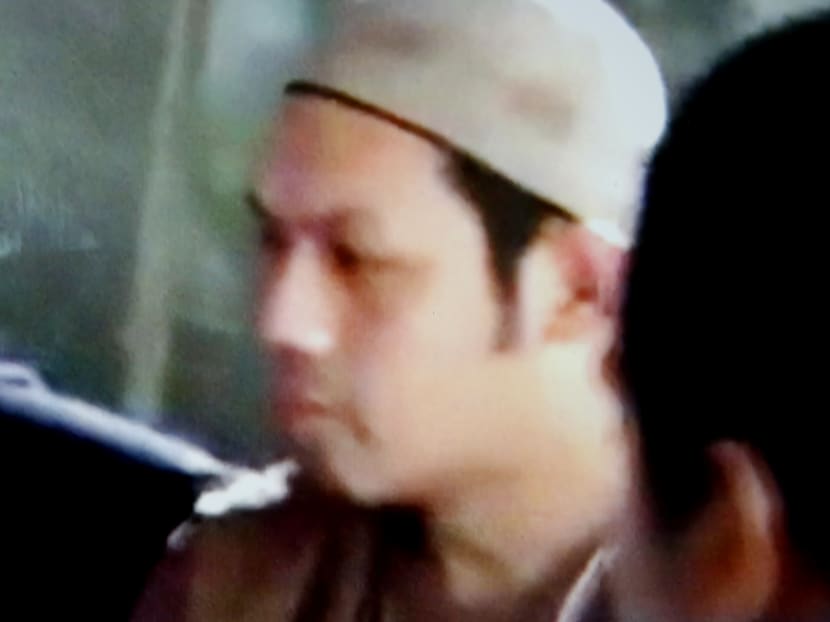Terrorist Mahmud still alive in Marawi, says Malaysia's top cop
KUALA LUMPUR — Malaysia’s police chief Khalid Abu Bakar on Friday (June 23) denied news reports that the country’s most wanted terrorist Mahmud Ahmad, who helped lead and finance the ongoing siege in Marawi City, has been killed.

This image taken from an undated video shown to The Associated Press by the Philippine military shows Malaysian militant Mahmud Ahmad, who helped lead and finance the siege in Marawi city. Troops are looking for his remains. Photo: AP
KUALA LUMPUR — Malaysia’s police chief Khalid Abu Bakar on Friday (June 23) denied news reports that the country’s most wanted terrorist Mahmud Ahmad, who helped lead and finance the ongoing siege in Marawi City, has been killed.
“Reports indicating that Mahmud has been killed is not true. He is still alive and fighting in Marawi,” Mr Khalid said, adding that to date, only four Malaysians have been confirmed killed in the battle.
Earlier, Philippine military chief of staff General Eduardo Ano told The Associated Press that Mahmud was wounded in the fighting in Marawi last month and reportedly died on June 7 of his wounds.
He said the military has a general idea of where the militant was buried and troops are trying to locate the exact spot with the help of civilians to recover the remains and validate the intelligence that was received.
Citing intelligence shared by foreign counterparts, Gen Ano said Mahmud — who is also known as Abu Hanadzalah — was suspected of channeling more than 30 million pesos (S$828,063) from IS to acquire firearms, food and other supplies for the siege.
The former Malaysian university professor had trained at an Al Qaeda camp in Afghanistan under Osama bin Laden while studying at Pakistan’s Islamabad Islamic University in the late 1990s before returning home to lecture at University Malaya.
He reportedly ran away to the Philippines after his militant ties were exposed in 2014.
Mahmud, 41, was one of five men sought by the Malaysian police for their alleged ties to terrorist organisations and was previously identified as a recruiter for IS.
He recently appeared in a video showing militant leaders planning the Marawi siege in a hideout, a sign of his key role in the uprising amid reports that he is the designated successor to Isnilon Hapilon, who was proclaimed by the IS last year as its “emir” in South-east Asia.
Gen Ado also said another militant, Omarkhayam Maute of the Maute group, is also believed to have been killed in the early days of intense fighting in Marawi.
However, Hapilon and Maute’s brother Abdullah, are said to be still with other gunmen fighting in Marawi.
The two men’s followers accounted for a large number of the estimated 400-500 militants including foreign fighters who overran parts of Marawi last month, killing Christians and taking dozens of civilians hostage.
Since then, troops have killed about 280 gunmen, recovered nearly 300 assault firearms and regained control of 85 buildings.
Despite signs that the rebels battling government forces were on the back foot, authorities are worried that the fighting — now in its fifth week — might be the beginning of a wave of violence as the ultra-radical IS tries to establish a foothold.
Malaysia is worried that militants could flee to its eastern state of Sabah. It has a wanted list of 18 individuals, which includes Hapilon and Abdullah.
Gen Ano said only four villages remain under the militants’ control.
“They are constricted in a very small area. They’re pinned down,” he said.
He also said three boatloads of gunmen, who tried to join the militants, were blasted by navy gunboats three days ago in Lanao Lake, which borders Marawi.
The gunmen may have either been militants repositioning from nearby areas or rebel reinforcements from elsewhere, he added.
Canberra said on that Friday (June 23) Manila has accepted an offer of assistance. Defence Minister Marise Payne said Australia would deploy two AP-3C Orion aircraft to provide surveillance support to the Philippine military. AGENCIES






